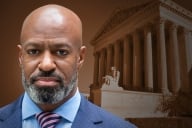You have /5 articles left.
Sign up for a free account or log in.
As Aragelia Salazar-Figueroa walked to her office Monday morning on the joint campus of University of Texas at Brownsville and Texas Southmost College, she noticed an unusual calm. “Monday is usually a busy day,” said Salazar-Figueroa, an associate vice president in student services. “Today it looks like a Friday.”
On the last day of classes, some students weren’t preparing for upcoming finals. They were gearing up for a march from campus to downtown Brownsville, a border city on the southern tip of Texas. The event coincided with hundreds of other rallies, protests and walkouts across the country on what was known as the “Day Without Immigrants.”
College employees joined others in skipping work on Monday in an effort to demonstrate Americans’ reliance on the immigrant workforce. The protests are in response to a bill passed in December by the U.S. House of Representatives aimed to toughen immigration laws. The Senate has yet to decide on its version of an immigration bill.
At UT-Brownsville and Texas Southmost, where 95 percent of students are of Hispanic heritage, a few professors cancelled classes in honor of the day of observation, and earlier encouraged students to use the time to participate in planned events, Salazar-Figueroa said.
At the State University of New York at Binghamton, more than 200 students participated throughout the day in a vociferous campus rally that was part of what student Adrianne Faya called an “all-American boycott.” “We were not working, not going to school, not selling and not buying,” said Faya, the daughter of parents who immigrated to the United States from Cuba. “We’ve always wanted to have more lenient laws for immigrants to become citizens.”
Faya and other student organizers advocated a complete boycott of stores on or near campus and offered food and drinks throughout the day as an alternative. Faya said one of her professors cancelled a class, enabling her to attend most of the rally. A few passers-by took issue with the event, though the rally was “completely peaceful,” Faya said.
Kent Wong, director of the Center for Labor Research and Education at the University of California at Los Angeles, planned to cut short his three-hour-long nonviolence and social movements class so that his students could attend rallies taking place in downtown Los Angeles.
“It’s quite appropriate that some students in this class will be participating [in the rallies],” Wong said. He co-teaches the class with the Rev. James Lawson, who worked alongside the Rev. Martin Luther King Jr. during the Civil Rights movement.
Wong said he expected college employees to be among those who participated in massive rallies in Los Angeles. Phil Hampton, a university spokesman, said UCLA employees weren't absent at a significantly larger rate than usual. Supervisors were told that vacation dates would be honored, but that employees calling in sick were to provide a doctor’s notice.
“Our goal is to allow employees, regardless of their political views, the chance to exercise free speech while also maintaining essential services on campus,” Hampton said. “Naturally, we encourage students to attend class. We value their free expression, and students like others are welcome to express their views.”
Brent Knight, president of Morton College, which is nearly three-fourths Hispanic, said he wasn’t aware of any professors who cancelled class at his institution, outside of Chicago. Knight said employees were free to take a personal day off, and that absences hadn’t hindered campus operations.
“Our policy is to be flexible and understanding,” Knight said. “That would apply to students and employees.”
Some colleges reported no difference in staff levels. At Fresno City College, for instance, a rally had been planned off campus in the evening so as to “not disrupt the regular school day,” said Cris Monahan Bremer, a university spokeswoman.








